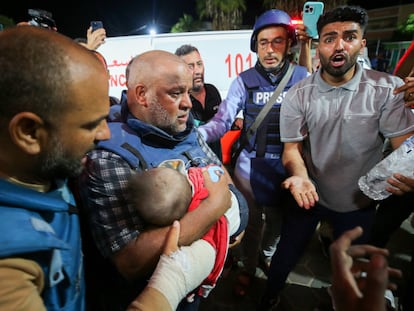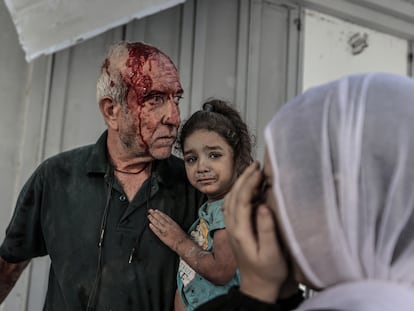Separated by Israeli occupation, bereaved by Gaza bombardment: ‘This is not a war. They are simply killing us’
Journalist Mohamed Farra learned that an attack in the Strip had killed five relatives whom he had not seen for 25 years due to the blockade, during a live broadcast from the West Bank
It has been a quarter of a century since Mohamed Farra last saw his sister, Simat. Now he knows he will never see her again. The current war has provided the final blow for thousands of Palestinian families who have been living in the West Bank for decades, cut off and divided by the Israeli blockade of Gaza. Cameraman Mohamed Farra, 45, a native of the Strip, was live on Al Araby television Wednesday during a protest in the West Bank city of Ramallah when he learned that an Israeli bombardment — a campaign that has already killed more than 7,000 people — had just taken the lives of his sister, brother-in-law, and three nieces. The siblings had last spoken that morning at around 7 a.m., he says.
“We have no hope as a people,” he laments, devastated and red-eyed, in the living room of his home. The room hosts something akin to a wake without the dead. “I’m sorry I can’t do anything,” he says between phone calls from people offering condolences. He is also aware that he has to go through the bitter mourning from a distance, despite the fact that only a hundred kilometers (61 miles) as the crow flies separate Ramallah from Khan Yunis, where the attack took place. If before Farra could not enter Gaza, now, under the bombs and surrounded by an army preparing a land invasion, it is an impossible prospect. Barely able to speak and in tears, it is left to one of his sons to offer coffee and dates to visitors.
“We are fine,” was the message the cameraman waited for daily, either by phone or through social networks, to confirm that his relatives were still alive under the constant bombardment. Since violence erupted 20 days ago when Hamas launched an attack on Israel, Farra has been trying to maintain contact with his family despite the complications affecting communications. He had instructed them to never be in the same place together at the same time, to avoid a missile killing them all at once.
The editor who accompanied him Wednesday, Fadi al Asa, explains that when they learned of the fatal outcome, they tried to keep Farra away from the scene while trying to decide how to break the news to him. But misfortune, like violence, spreads quickly and soon his phone rang. He was still wearing his bulletproof vest, as can be seen in the video recorded at the scene as he was being taken away in a car.
Life goes on, and so does the war. Al Asa kept up the pace of live connections Thursday and covered a demonstration in Ramallah’s central square in solidarity with the victims in Gaza. A sign made of traditional pottery marks the distance to Jerusalem: 15 kilometers (9.3 miles). Separating the two stands the concrete fortress of the Qalandia crossing, which is controlled by the Israel Defense Forces.
Around 200 people, who are handed photographs of dead bodies from Gaza to display, march through the streets around the square in Ramallah, the administrative capital of the West Bank. They chant slogans against the occupation, deny being terrorists, and raise their voices against Israeli Prime Minister Benjamin Netanyahu. “Please make our words heard,” says Ama Matjar, a 61-year-old attendee.
Yasser Amor, a 45-year-old professor of acting at Bir Zeit University, holds a white poster board in his hands explaining the reason for his presence at the protest. “An end to [Israeli] terrorism, an end to Israel’s occupation of Palestine and the right to self-determination,” he says. “Since 1948, everything has been getting worse,” he adds, referring to the date of the creation of the State of Israel. That same year, the Palestinian people were subjected to the Nakba (catastrophe, in Arabic), when 700,000 people — more than half of the total population, according to the UN — were expelled from their homes by Israeli forces. Following the Hamas attack on October 7, one million civilians have been forcibly displaced under bombardment from northern Gaza following the ultimatum issued by Israel. An exodus reminiscent of that of 75 years ago, to which Palestinians are constantly alluding amid the latest conflict.
Farra is originally from Gaza, but he married a woman from the West Bank in 1998 and has been living in Ramallah ever since. In the 25 years that have passed, he has not been able to return home. The last time he set foot in the Strip was when he returned from his honeymoon in Tunisia, he recalls. On five occasions he has tried to return to Gaza, but Israeli forces prevented him from doing so. The enclave is surrounded and isolated from the rest of the world by a veritable fortress made up of concrete walls, barbed wire fences, surveillance cameras, turrets and hundreds of Israeli soldiers who control the entrance and exit points.
The home in a four-story building in Khan Yunis, southern Gaza, where Farra’s sister Simat lived with her husband Esam and their five children, was hit by a shell Wednesday morning. In addition to the parents, the three daughters — Adian, Rosol and Tuka — were killed, and the two sons — Hatem and Khalil — who were rescued from the rubble, were wounded. “We are all fighters for the homeland!” Hatem says, among other religious phrases, from a hospital stretcher in a video posted on social networks showing his uncle Mohamed. The teenager is still covered in dust and blood and with his head bandaged. “This is not a war. They are simply killing us,” Farra says, as he stands up to shake hands with two new visitors who have arrived at his home.
The attack that killed five members of Farra’s family came just hours before another Israeli bombing killed the wife and two children of Wael Dahdouh, chief correspondent for Al Jazeera television in the Strip. Since the Hamas attack, a dozen Palestinian reporters have been killed by airstrikes and the headquarters of 50 media outlets have been destroyed or damaged. Farra is broken just 24 hours after losing a large part of his family, but he is already thinking of returning to the streets. “We have to keep telling stories as soon as possible,” he states.
Sign up for our weekly newsletter to get more English-language news coverage from EL PAÍS USA Edition











































